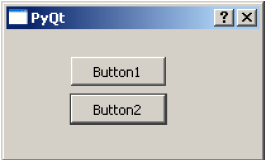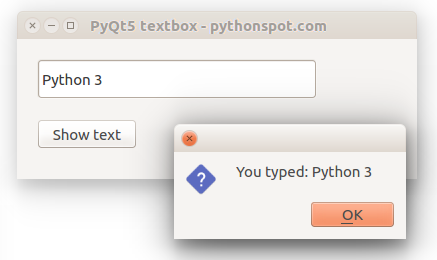Pyqt Signals And Slots Across Threads
- Pyqt Signals And Slots Across Threads Onto
- Pyqt Signals And Slots Across Threads Free
- Pyqt Signals And Slots Across Threads Crossword
- Pyqt Signals And Slots Across Threads Game
This interesting article evaluates how often are objects copied when passed across signal/slot connections in Qt. Basically, the outcome is that when passed by const reference in C, objects are either not copied at all (for direct connections) or copied once (for queued connections). It Signals And Slots Across Threads Qt is your Signals And Slots Across Threads Qt own responsibility to determine if gambling online from Signals And Slots Across Threads Qt your current location is legal. Playing casino games involves risk and should be considered a fun, recreational activity, not a way to earn an income. If the signal has parameters you want to compare with expected values, you can pass checkparamscb=somecallable that compares the provided signal parameters to some expected parameters. It has to match the signature of signal (just like a slot function would) and return True if parameters match, False otherwise.
- Signals and Slots Across Threads Qt supports these signal-slot connection types: Auto Connection(default) If the signal is emitted in the thread which the receiving object has affinity then the behavior is the same as the Direct Connection. Otherwise, the behavior is the same as the Queued Connection.'
- We’ve put together an updated list of the best casino bonuses for Pyqt Signals And Slots Across Threads new players. Simply visit any of the online casinos that are listed below and follow the instructions to redeem a Pyqt Signals And Slots Across Threads casino bonus and play your favorite casino games.
Recently, I was writing an integration test for a data visualization GUI. The GUI calls out to an external process to run a simulation, waits for the simulator to produce data, and reads the data back in to produce pretty graphs, export data to other formats, etc. I use a PySide signal to inform the GUI that the simulator has produced data. Unfortunately, I couldn’t find a clean way to have my integration test wait for that signal. Luckily, I have found the solution, and I’ll explain it here.

Signals and Slots
PySide and PyQt are Python bindings to the Qt GUI and application framework. One killer feature of Qt is the signal & slot system, which is a way for widgets and objects to communicate events to one another.
An object in Qt can send a signal to other subscribed objects. Signals are used to inform other objects that an event has occurred. For example, buttons fire the QPushButton.pressed signal when they are clicked. When you want to handle a button click, you connect the signal to a function. You can create your own signals, and connect them to arbitrary python functions. In my GUI, I have something like the following:
In this code snippet, we create the Simulator and DataReader classes, and connect them together using a signal. The Simulator class is a QObject, so it can send signals. It runs a simulation in a separate process, and then emits the finished signal when it’s done. We also happen to use a button that starts the simulation when clicked. We connect the simulator’s finished signal to the DataReader so it knows when to begin reading data.
The Test
So, how do I test the above code? I want to run the simulator and make sure it has the correct output. I initially wrote a test like this:
What’s wrong here? The assertion line is executed too early; the simulator probably hasn’t even started in the nanoseconds between when I told it to start and when I check the data! How can we solve this issue? I tried a time.sleep() loop that polls if the simulation is complete. This blocks the main GUI thread, and is not a good solution. I also tried similar things using the threading module, but to no avail. It turns out, we can use a new Qt event loop to stop execution.

Solution
I figured out that you can call QEventLoop.exec_() to create a nested event loop. That is, our QApplication instance event loop is already running, but calling QEventLoop.exec_() will stop execution using a new event loop until QEventLoop.quit() is called. Here is our modified example test:
We create an event loop that will help us wait for our simulation to complete. When run_simulation() is called, we wait at the loop.exec_() line until finished is emitted. When the simulator finishes, the event loop will exit, and we will advance beyond the loop.exec_() line.
General Solution
There is one problem with this approach. What if simulator.finished is never emitted, like when an error occurs? We would never advance beyond loop.exec_(). If we had this test running on a continuous integration server, we would lock up a job forever until we realized the test never finished!
A solution is to use the QTimer.singleShot() function with a timeout. That means for every time we want to create an event loop, we have to set up the loop, hook up our signals, and create a timer with a suitable timeout in case the signals never fire. Here is a context manager that can handle this for us:

Pyqt Signals And Slots Across Threads Onto
We can use it like this:
Pyqt Signals And Slots Across Threads Free
Isn’t that great? I think so.
pytest-qt
I run my tests using the pytest library. There is a plugin for pytest called pytest-qt, which comes with a fixture called qtbot. A qtbot is used to handle all of the boilerplate that comes along with testing PySide/PyQt code, like:
- Setting up a QApplication
- Simulating mouse clicks and keyboard interaction
- Closing windows after tests
Once I figured out how to stop test execution to wait for a signal, I created a pull request to add this functionality to pytest-qt. I created a more general solution that allows multiple signals, or none at all (just wait for a timeout). If you use PySide/PyQt, but you think testing your GUI code is a pain, check out pytest-qt! Take a look at the example in the docs to see how to use pytest-qt to block tests for signals.

Pyqt Signals And Slots Across Threads Crossword
Thanks for reading!
Please enable JavaScript to view the comments powered by Disqus.comments powered by